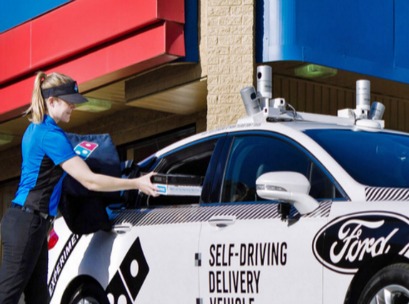Domino’s Pizza Enterprises is not like any fast food chain out there. Perhaps it’s because it doesn’t even refer to itself as one – but rather as a technology company. Its unique position in the market has come after years of embracing new and innovative ways to enhance the digital experience for its customers – with the ultimate goal of getting its pizzas delivered faster. Domino’s has delivered countless innovations over the years including Dru, the robotic unit, the pizza tracker,
and on-time cooking to let customers know their pizza will only be cooked once they’re close to their nominated pick-up store.
Domino’s recently reported that nearly two-thirds of its sales are now made online; no doubt a result of these innovations.
It’s only a matter of time before more businesses like Domino’s revolutionise the way they service customers, causing further disruption to the local market – so retailers need to consider how to remain competitive in what will only become a noisier, more complex and faster-paced environment.
Retailers must closely examine how they meet the expectations of consumers who live in today’s individual economy. Customers demand retailers deliver what they want, where they want it and when they want it. They certainly don’t care that their fluid demands are uneconomic to the business – that’s the business’s problem!
This is a complete role reversal to how online goods were traditionally delivered to consumers – with businesses choosing when and how a product was delivered, not the customer.
Irrational, emotional customers
In spite of an 18.7 per cent increase in online purchases, according to recent data from Australia Post, retailers are still struggling to fully optimise their e-commerce offerings. Even more concerning are the findings from a recent study, which highlight that Australian logistics companies do not expect to provide same-day delivery until 2023 – which is simply too late.
The long-term survival of local retailers will depend on their collective ability to meet the demands of irrational, emotional consumers who buy from brands that meet their expectations and ditch those that don’t. In fact, a 2017 YouGov study found that 70 per cent of Australian shoppers said they are likely to switch to an alternative retailer if they’re dissatisfied with their online shopping experience.
The risk of losing customers to other retailers will be further exacerbated by the anticipated growth of the online retail market. In the US, more than 50 per cent of shopping journeys start with Amazon – and there’s no reason to believe Australian consumers won’t follow suit.
Retailers will be required to make cultural, operational and technology changes to meet these consumer expectations. The first step is to deliver a personalised, transparent and simple order fulfilment process that enables consumers to track their purchased product in real-time, from the warehouse to when it is placed in their hands. This process also needs to be flexible enough for customers to choose when and where their goods are delivered or collected from.
Woolworths and 7-Eleven show how it’s done
Woolworths’ recent growth figures – including the success of Endeavour Drinks Group – reflect the importance of this shift towards meeting the expectations of consumers who want command of their own experience. This increased focus on bringing control, convenience and simplicity to deliveries will be critical for retailers.
Convenience giant 7-Eleven has caught on to the demands of the the era, reflected by its acquisition in the majority stake of Tipple – an on-demand liquor delivery startup. This move by 7-Eleven will provide access to the startup’s proprietary delivery platform, which currently allows customers to order from their local bottle shop through its website and mobile app, and have items delivered within 30 minutes.
Similarly, The Liquor Marketing Group, which owns Bottlemart and Sip ‘n Save stores, recently launched a new e-commerce platform, including an app for android and Apple phones – which has options for one-hour delivery, nominated delivery windows and parcel pick-up in 30 minutes. While the platform is currently in trial phase, the company has already seen average basket sizes increase by 47 per cent on in-store purchases.
No doubt Australian retailers will continue to face challenges on several fronts when it comes to operating online – but with Amazon Australia expected to keep increasing its presence in the local market, there is no time for these businesses to contemplate how to remain competitive. They must act fast to create a more transparent, personalised and flexible fulfilment experience – or risk losing customers to competitors that do.
Tim Andrew is the co-founder and CEO of Localz, a company founded in Melbourne that is leading the way in last mile fulfilment by enabling first-time deliveries.

